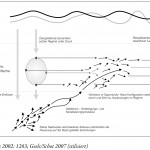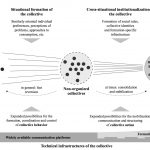Querverweis: »Metaverse through the prism of power and addiction«
Jan-Felix Schrape | 30. Oktober 2022Der Belgrader Digitalisierungsforscher Ljubisa Bojic hat im European Journal of Futures Research einen ordnenden und mitunter auch spekulativen Artikel zu den Forschungsperspektiven zu Mark Zuckerbergs Vision eines aufkommenden ›Metaverse‹ veröffentlicht (»Metaverse through the prism of power and addiction«):
»New technologies are emerging at a fast pace without being properly analyzed in terms of their social impact or adequately regulated by societies. One of the biggest potentially disruptive technologies for the future is the metaverse, or the new Internet, which is being developed by leading tech companies. […] Hype and disappointment dynamics created after the video presentation of meta’s CEO Mark Zuckerberg have been found to affect the present, especially in terms of certainty and designability. […] It has been found that discourse in the mentioned presentation of the metaverse contains elements of optimism, epochalism, and inventibility, which corresponds to the concept of future essentialism.
On the other hand, power relations in society, inquired through the prism of classical theorists, indicate that current trends in the concentration of power among Big Tech could expand even more if the metaverse becomes mainstream. Technology deployed by the metaverse may create an attractive environment that would mimic direct reality and further stimulate media addiction in society. It is proposed that future inquiries examine how virtual reality affects the psychology of individuals and groups, their creative capacity, and imagination. Also, virtual identity as a human right and recommender systems as a public good need to be considered in future theoretical and empirical endeavors.«
Dabei nimmt Bojic wie folgt auf die Arbeiten der Stuttgarter Organisations- und Innovationssoziologie Bezug (S. 7f.):
»Dolata and Schrape analyze the power of technological platforms as institutions. They focus on the economic power over resources, research, power over data of users, and infrastructural and rule-setting power within platforms, as the tech companies ›structure the online experience of individual users and collectives and prescribe framework conditions for their activities, whereby they ultimately influence users’ behavior and actions‹.
To sum it up, power in the metaverse will be determined based on who gets to regulate this upcoming technology; as noted by Dolata and Schrape, additional important foundations of power are trust of public, which has its ideological backing, which is related to the theory of Michael Mann, and strong cultural and moral impact, which corresponds to ideas of Antonio Gramsci. Development of metaverse will fuse the ideology of AI with its media power to influence content that is consumed by citizens, or in other words the truth, examined by Foucault. Finally, one of the most important constituents of power in the metaverse will be complete control over the virtual identity of its users. That will be even more important as more and more work-related tasks and jobs themselves migrate to the metaverse.
All the above-noted elements of power are strongly dependent on who determines rules in the metaverse, which is one of the essential building blocks behind ideas by Dolata and Schrape on power in contemporary tech-driven society.«











